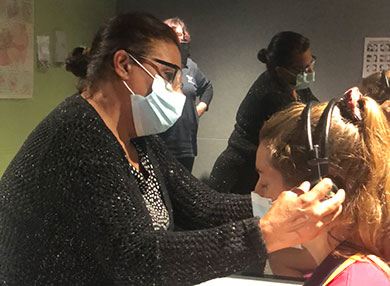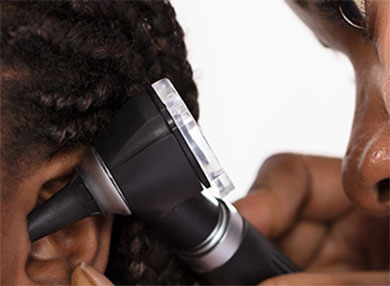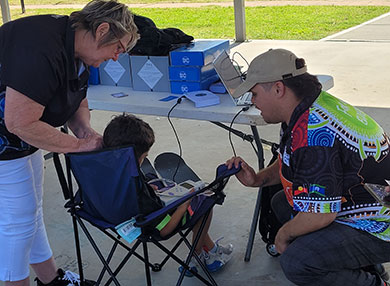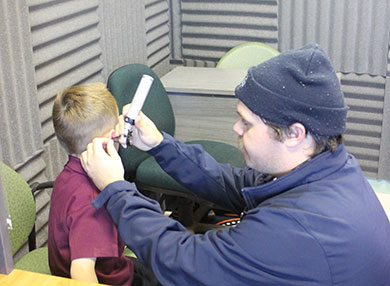Macquarie University Hearing
A program of measurable and impactful change
Research projects in this area use a multidisciplinary and community-engaged approach to solve major hearing health problems in Aboriginal children.
Learn more about the projects we are undertaking in this area.
Improving care pathways for otitis media in Aboriginal children
Full title: Improving care pathways for otitis media in Aboriginal children (0–12): A case study approach
 Funded by: Medical Research Futures Fund Indigenous Health, Hearing Australia
Funded by: Medical Research Futures Fund Indigenous Health, Hearing Australia
The vast majority of hearing loss in Australian Aboriginal children is caused by persistent and pervasive otitis media (OM).
In partnership with three Aboriginal Community Controlled Health Services, spanning urban, rural and remote geographical areas, we will use the WHO framework for health systems performance to:
- identify the strengths and constraints of the current healthcare system for OM in Aboriginal children (0–12 years)
- co-design, implement and evaluate a method of addressing OM and hearing loss in this target population.
We will:
- identify the features of successful ear and hearing healthcare delivery
- deliver a toolkit, with guidelines and training programs, to apply these findings to other communities and localise successful approaches across Australia.
- Professor Catherine McMahon
- Professor Elizabeth Pellicano
- Dr Kylie Gwynne
- Professor Leanne Holt
- Associate Professor Boe Rambaldini
- Dr Neil Orr
- Samantha Harkus (Hearing Australia)
- Professor Harvey Coates (University of Western Australia)
- Professor Andrew Smith (London School of Hygiene and Tropical Medicine)
- Dr Liesa Clague (University of Newcastle)
Our research partners:
- Macquarie University HEAR Centre
- Hearing Australia
- University of Western Australia
- London School of Hygiene and Tropical Medicine
- University of Newcastle
Contact: cath.mcmahon@mq.edu.au
Listening and Language in Aboriginal Children (LiLAC)
Funded by: Australian Government’s Indigenous Australians Health Program
 Aboriginal children are at high risk of middle ear disease, which typically leads to hearing loss, impacting development.
Aboriginal children are at high risk of middle ear disease, which typically leads to hearing loss, impacting development.
This consortium will work with three NSW Aboriginal communities to co-design, implement and evaluate sustainable and culturally safe pathways and services.
This project will:
- deliver the first service that encompasses screening for listening/talking and access to speech/language programs for Aboriginal children with hearing loss
- develop the capacity of existing services and strengthen referral pathways to respond to the needs of Aboriginal families, aligning with community approaches to language reawakening
- provide a system of supports for the community to facilitate children’s communication, language, cognitive and emotional development, and improve children’s abilities to participate in learning and social activities.
- Professor Catherine McMahon
- Dr Kylie Gwynne
- Professor Leanne Holt
- Professor Gregory Leigh
- Dr Jim Hungerford (The Shepherd Centre)
- Samantha Harkus (Australian Hearing Services)
- Mark Fitzpatrick (First Voice Australia)
Our research partners:
- Macquarie University HEAR Centre
- Brewarrina Aboriginal Medical Centre
- Katungul Aboriginal Medical Centre
- Hearing Australia
- NextSense
- The Shepherd Centre
- First Voice Australia
Contact: cath.mcmahon@mq.edu.au
Scalable hearing rehabilitation for low- and middle-income countries
Funded by: USAID in support of ATscale and managed by the UNOPS
 This study investigated scalable models of hearing rehabilitation delivery in low- and middle-income countries (LMICs).
This study investigated scalable models of hearing rehabilitation delivery in low- and middle-income countries (LMICs).
We found that hearing profiles in LMIC clinical populations differed from high income clinical populations in several important ways. The profiles or patterns of hearing loss in LMIC populations were:
- more severe
- flatter in shape
- more likely to have conductive components.
We also found that existing low-cost, easy to fit devices provided a moderate to good outcome for most of the study participants.
Large scale implementation trials are the next step required to confirm the benefits of this method of hearing intervention.
Australia
- Dr John Newall
- Dr Fadwa Alnafjan
- Dr Rebecca Kim (Jim Patrick Audiology Centre)
- Professor Piers Dawes (The University of Queensland)
Cambodia
- Glyn Vaughan (All Ears Cambodia)
China
- Xuewei “Brad” Zhou (Jilin University)
Dominican Republic
- Donna Carkeet (EARS Inc Hearing Clinic Centro Cristiano de Servicios Medicos)
- Miguel Evangelista (EARS Inc Hearing Clinic Centro Cristiano de Servicios Medicos)
Egypt
- Dr Heba Ghannoum (Faculty of Medicine Helwan University/Nile Center for Audiovestibular Medicine)
Hong Kong China
- Professor Bradley McPherson (University of Hong Kong)
India
- Professor Nitish Patel (Dr S R Chandrasekhar Institute of Speech and Hearing, Bangalore)
- Nitin Daman (Dr S R Chandrasekhar Institute of Speech and Hearing, Bangalore)
- Professor Megha Sasidharan (Dr S R Chandrasekhar Institute of Speech and Hearing, Bangalore)
- Professor S P Goswami (All India Institute of Speech and Hearing)
- Dr C Geetha (All India Institute of Speech and Hearing)
Indonesia
- Dr Dahlia Sartika (Kasoem Hearing & Speech Centre)
- Dr Siti Fatimah (Kasoem Hearing & Speech Centre)
Jordan
- Dr Sara Al-Hanbali (University of Jordan Hospital Hearing and Speech Clinic, School of Rehabilitation Sciences)
Malawi
- Peter Bartlett (ABC Hearing Clinic)
- Rebecca Bartlett (ABC Hearing Clinic)
Malaysia
- Dr Noor Afzarini Hasnita Binti Ismail (Department of Audiology and Speech-Language Pathology, International Islamic University Malaysia, Kuantan Campus)
Nepal
- Dr Mike Smith (Ear Centre, Green Pastures Hospital, International Nepal Fellowship, Pokhara)
- Anup Ghimire (Ear Centre, Green Pastures Hospital, International Nepal Fellowship, Pokhara)
- Dr Shankar Shah (Department of Otolaryngology HSN, BP Koirala Institute of Health Sciences, Dharan)
- Dr Sudip Misra (Department of Otolaryngology HSN, BP Koirala Institute of Health Sciences, Dharan)
- Dr Shyam Thapa Chetri (Department of Otolaryngology HSN, BP Koirala Institute of Health Sciences, Dharan)
The Philippines
- Professor Norberto Martinez (University of Santo Tomas, Faculty of Medicine and Surgery)
- Professor Hubert Ramos (University of Santo Tomas, Faculty of Medicine and Surgery)
- Ultima Anglea Alparce (University of Santo Tomas, Faculty of Medicine and Surgery)
Russia
- Dr Vigen Bakhshinyan (National Research Centre for Audiology and Hearing Rehabilitation, Moscow)
Professor Maria Boboshko (Laboratory of Hearing and Speech St. Petersburg State Medical University)
- Professor George Tavartkiladze (National Research Centre for Audiology and Hearing Rehabilitation, Moscow)
- Dr Polina Kredina (National Research Centre for Audiology and Hearing Rehabilitation, Moscow)
Samoa
- Dr Annette Kasper (Tupua Tamasese Meaole Hospital)
- Dr Sione Pifeleti (Tupua Tamasese Meaole Hospital)
South Africa
- Professor De Wet Swanepoel (University of Pretoria)
- Professor Herman Myburgh (University of Pretoria)
- Caitlin Frisby (University of Pretoria)
Thailand
- Assistant Professor Dr Pittayapon Pitathawatchai (Prince of Songkla University)
Türkiye
- Professor Dr Ahmet Ataş (Istanbul University, Cerrahpasa)
- Professor Dr Bülent Şerbetçioğlu (Istanbul Medipol University)
- Professor Dr Gonca Sennaroğlu (Hacettepe University)
- Professor Dr Özlem Konukseven (Istanbul Aydın University)
- Professor Dr Suna Yilmaz (Ankara University)
- Professor Dr Didem Türkyilmaz (Hacettepe University)
- Associate Professor Zahra Polat (University of Health Sciences)
- Associate Professor Merve Batuk (Hacettepe University)
- Dr Eyyup Kara (Istanbul University, Cerrahpasa)
- MSc. Duygu Hayir Şenkaya (Cerrahpasa)
- MSc. Merve Çinar Satekin (Ankara University)
- MSc. Gizem Babaoğlu Demiröz (Hacettepe University)
- MSc. Yeşim Oruç (Istanbul University, Cerrahpasa)
- MSc. Zehra Ayaz Aydoğan (Ankara University)
- Büşra Nur Eser (Istanbul Medipol University)
- Şeyma Tuğba Öztürk (Istanbul Medipol University)
- Sude Keyaki (Istanbul Medipol University)
- Melek Başak Özkan (Istanbul Aydın University)
- Merve Meral (Istanbul Aydın University)
- Dr Aysenur Kucuk Ceyhan (Istanbul Aydın University)
- Dr Inci Adali (Istanbul Aydın University)
Our partners:
Contact: john.newall@mq.edu.au
LEAP-HEAR
Full title: Little Ears Aboriginal Programs – Hearing and EAR Screening (LEAP-HEAR)
Funded by: Ian Potter Foundation, Cochlear Ltd, Macquarie University
 This program aims to mitigate the effects of ear disease and hearing loss in Aboriginal and Torres Strait Islander children by:
This program aims to mitigate the effects of ear disease and hearing loss in Aboriginal and Torres Strait Islander children by:
- strengthening and evaluating three long-standing hearing screening programs in three Aboriginal communities in NSW
- establishing an effective and scalable model for national roll-out.
We will:
- establish global and community-based performance indicators of success and perceived value for school ear and hearing screening programs for middle ear disease and hearing loss for priority populations
- scope government initiatives and policies to enable long-term program sustainability
- use a systems-based approach to evaluate and strengthen programs
- align local program data capture, reporting and quality assurance with large-scale government initiatives
- collaboratively design a robust model with stakeholders.
- Professor Catherine McMahon
- Dr Kylie Gwynne
- Professor Leanne Holt
- Associate Professor Carmen Parter
- Associate Professor Boe Rambaldini
- Luke Halvorsen
- Cara Cross
- Scott Monaghan (Bulgarr Ngaru Medical Aboriginal Corporation)
- Katrina Ward (Walgett Aboriginal Medical Service Limited)
- Kayeleen Brown (Katungal Aboriginal Corp Regional Health and Community Services)
- Michele Clapin (Australian Hearing Services)
- Donna Murray (Indigenous Allied Health Australia Ltd)
- Melanie Pescud (National Indigenous Australians Agency)
Our research partners:
- Macquarie University HEAR Centre
- Macquarie University Djurali Centre
- Brewarrina Aboriginal Medical Centre
- Bulgarr Ngaru Medical Aboriginal Corporation
- Katungul Aboriginal Medical Centre
- Indigenous Allied Health Australia (IAHA)
- National Aboriginal Community Controlled Health Organisation (NACCHO)
- Federal Government’s Indigenous Health
Contact: cath.mcmahon@mq.edu.au
Systematically, Together Overcoming Racism Model (STORM)
Full title: Systematically, Together Overcoming Racism Model (STORM): co-designing a robust framework to reduce racism across the hearing health sector
 Funded by: Medical Research Futures Fund Indigenous Health
Funded by: Medical Research Futures Fund Indigenous Health
Racism is a major barrier for Aboriginal and Torres Strait Islander people to access high-quality and timely healthcare. Racial inequality in hearing health can affect education and social development.
We will work with the Hearing Health Sector Alliance – a network of hearing healthcare organisations – to develop and implement initiatives to reduce racism in the sector, with Aboriginal health organisations providing leadership and support.
We aim to do this by:
- developing and validating the Institutional Racism Matrix for Professional Bodies to establish an assessment tool
- evaluating the extent of racism within the sector
- charting best practice of eradicating racism from organisations
- co-designing strategies, policies and procedures to eradicate racism with HHSA organisations.
- Professor Catherine McMahon
- Luke Halvorsen
- Professor Kelvin Kong (University of Newcastle)
- Donna Murray (Indigenous Allied Health Australia Ltd)
- Professor Henrietta Marrie (Bukal Consulting)
- Associate Professor Adrian Marrie (Bukal Consulting)
- Rebecca Allnutt (NT Health)
Our research partners:
- Macquarie University HEAR Centre
- University of Newcastle
- Indigenous Allied Health Australia (IAHA)
- Bukal Consultancy Services Pty Ltd
- Northern Territory of Australia
- Audiology Australia Ltd
- Australian Society of Otolaryngology, Head & Neck Surgery
- Speech Pathology Australia Ltd
- National Association of Aboriginal and Torres Strait Islander Health Workers and Practitioners (NAATSIWP)
- First Voice Australia
- The Audiometry Nurses Association of Australia Incorporated
- Australian College of Audiology Ltd
- National Aboriginal Community Controlled Health Organisation (NACCHO)
- Hearing Aid Audiology Society of Australia
Contact: cath.mcmahon@mq.edu.au